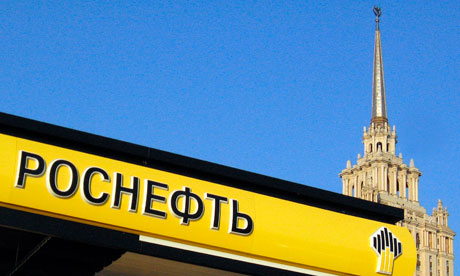BP fears sanctions over stake in Russian oil firm will hit profits | Business | The Guardian

BP has a 20% stake in Rosneft. Photograph: Alexander Nemenov/AFP/Getty Images
BP has warned investors that its finances and corporate image could be hurt by western sanctions against Russia.
The British oil and gas group is exposed to Russia via its 20% stake in Kremlin-controlled oil company Rosneft, a significant contributor to its profits which could be hit by EU curbs on exports of oil production equipment to Russia. BP revealed on Tuesday that it made $1.6bn (£950m) from its interest in Rosneft in the first six months of 2014, on top of a $700m dividend from Rosneft in July.
In a statement issued before news emerged of EU sanctions, BP acknowledged that its reputation was at stake over its ties to a company that generates over 4% of the world's crude and over 8% of Russian GDP.
"Further economic sanctions could adversely impact our business and strategic objectives in Russia, the level of our income, production and reserves, our investment in Rosneft and our reputation," BP said.
Earlier this month the US added Rosneft to its sanctions list by putting restrictions on its access to dollar funding. Igor Sechin, the chairman of Rosneft and a close friend of Vladimir Putin, has been on the US sanctions list since April, which means he is banned from entering the US and his assets have been frozen.
As EU leaders have struggled to keep a united front amid the conflict in eastern Ukraine, BP has stuck to a business-as-usual policy with Russia. In May BP and Rosneft struck a deal to exploit potential shale reserves in the Urals at a ceremony attended by Putin at the St Petersburg International Economic Forum, a Russian Davos that was shunned by many western business leaders.
BP's exposure to Russia was highlighted on Monday when a tribunal in the Hague ruled that Rosneft had been the prime beneficiary from a "devious and calculated expropriation" by the Russian government against Yukos, once Russia's largest private oil company, broken up by Moscow after its boss fell foul of Putin. Rosneft went on to acquire Yukos's best assets at rock-bottom prices. Shareholders have vowed to pursue Rosneft for a $50bn damages claim and indicated they may also pursue BP.
Bob Dudley, BP's chief executive, dismissed "speculation" about the ruling. "The arbitration does not concern BP and neither is Rosneft actually a party to it," he said, adding that he did see BP's dividend from Rosneft at risk.
Dudley served as chief executive of TNK-BP, the previous incarnation of BP's Russian business. TNK-BP was an acrimonious but highly profitable venture with a quartet of Russian oligarchs. Dudley was expelled from Russia in 2008 and the venture came to an end last year, when Rosneft took over TNK-BP handing BP almost $17m in cash as well as the UK firm's current stake.
Dudley said BP intended to stay the course in Russia, but added it had been a good decision to reduce its involvement.
Analysts say BP is more exposed to political volatility in Russia than any of its competitors, a factor that has weighed on its share price. BP shares had "hugely underperformed" compared with its main rivals, said financial analyst Jasper Lawler, a financial analyst at CMC Markets. He noted that BP's share price had risen by 2% since early June, while Royal Dutch Shell, Exxon Mobil and Chevron had each increased by more than 9%.
Dudley said BP could have left Russia in 2013, but chose not to. "We absolutely stand by strategically what we have done. We are very, very long-term investors. We work in countries that have ups and downs." The BP chief executive saidHe added that he had taken legal advice on sanctions, and that he had not come under any diplomatic pressure about travelling to Russia.
American sanctions against Rosneft, which have frozen the Russian firm out of US capital markets, had not had any impact on BP, Dudely said.
BP's earnings from Rosneft have been a significant contributor to its bottom line. Profits for the second quarter, stripping out the effects of oil price movements, were up $3.6bn in the second quarter, compared with $2.7bn the previous year.
BP said it had also benefited from improved performance at many recently built refineries, including in the Gulf of Mexico, Azerbaijan and Angola, while an upgrade of BP's Whiting refinery in Indiana, in the US, contributed $7.9bn to its cash flow. BP shares were up during early trading on Tuesday, but later fell 1.6% to 489p as concern on the impact of western sanctions against Russia mounted.